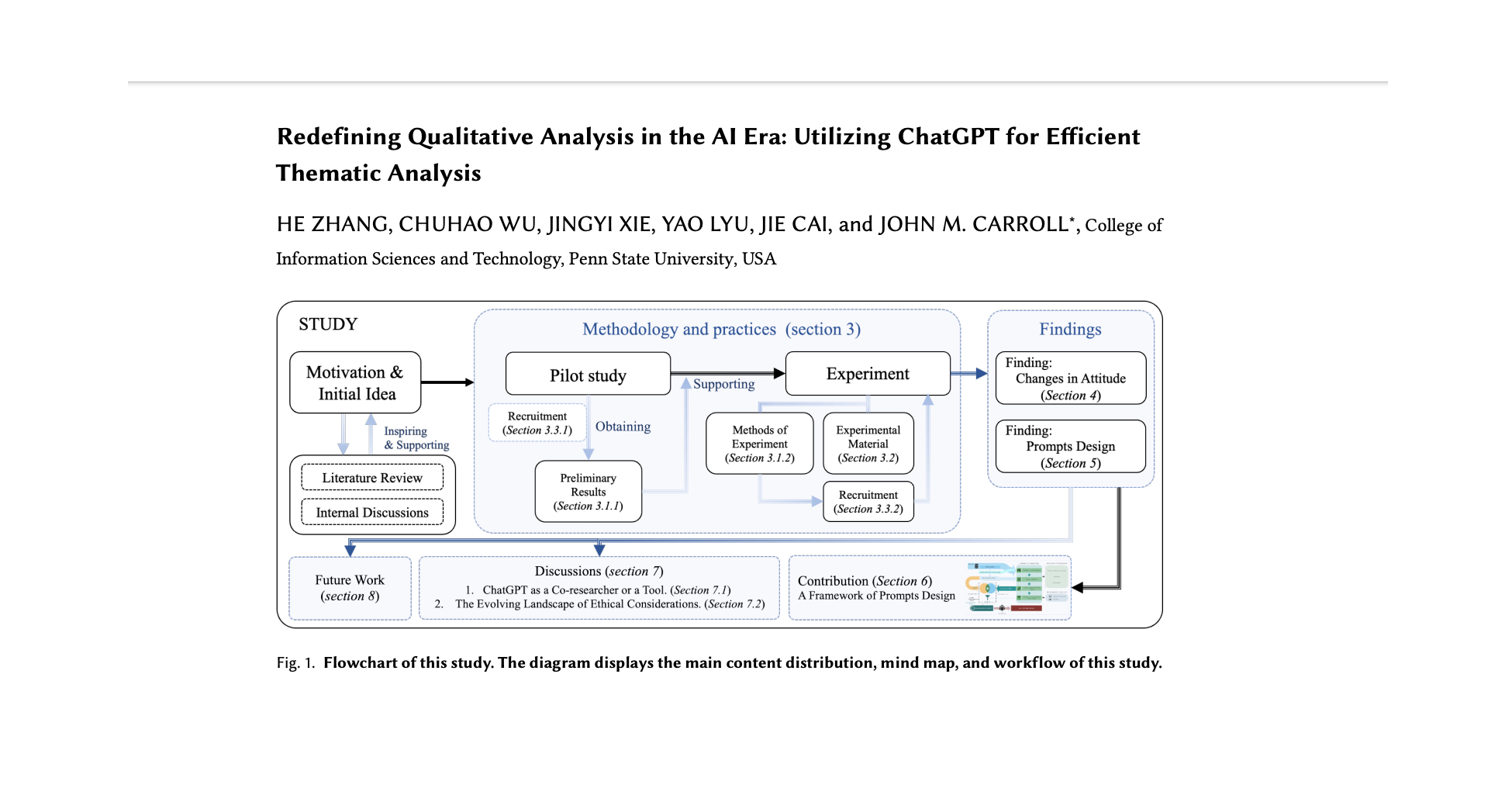
Authors
He Zhang, Chuhao Wu, Jingyi Xie, Yao Liu, Jie Cai, and John M. Carroll.
Academic Affiliation
College of Information Sciences and Technology, Penn State University, USA
Abstract
Thematic analysis, a fundamental qualitative research method, faces challenges due to its labor-intensive nature. This study explores how ChatGPT, a large-scale language model, can improve thematic analysis. Through semi-structured interviews with 17 participants and collaboration with 13 qualitative analysts, the study develops frameworks to enhance ChatGPT’s utility in thematic analysis. The results highlight the potential of integrating AI with qualitative research, promising advancements in data analysis quality and efficiency. You can read full article here.
Why should you read this paper?
This paper reveals how ChatGPT can revolutionize qualitative research by making thematic analysis more efficient and effective, marking a significant step forward in the integration of AI and human-centric research.
Key Points
- Thematic analysis, critical in qualitative research, is resource-intensive and challenging.
- Advances in AI, particularly ChatGPT, offer opportunities to streamline thematic analysis.
- A study involving semi-structured interviews and collaboration with analysts resulted in frameworks enhancing ChatGPT’s thematic analysis capabilities.
- Results show these frameworks improve thematic analysis quality and foster AI-qualitative research integration.
Broader Context
Thematic analysis is indispensable across disciplines for extracting meaningful patterns from qualitative data. Yet, its intensive nature demands innovation. This research, set against the backdrop of AI’s rapid evolution, not only seeks to alleviate the traditional burdens of thematic analysis but also pioneers the symbiosis of AI capabilities and human insight, promising a transformative impact on qualitative research methodologies and outcomes.
Q&A
- What challenges does thematic analysis face?
- Thematic analysis is often time-consuming and requires substantial manual effort, making the process daunting for researchers.
- How can ChatGPT improve thematic analysis?
- By developing and utilizing specific frameworks, ChatGPT can enhance the efficiency and quality of thematic analysis, offering a new avenue for qualitative research.
- What implications does this study have for future research?
- It underscores the potential of AI in qualitative research, paving the way for more integrated, efficient analysis methods that could reshape research paradigms.
Deep Dive
The study delves into “cueing frameworks” designed to optimize ChatGPT’s performance in thematic analysis. These frameworks guide the AI in identifying and categorizing themes more accurately, demonstrating how targeted prompt engineering can significantly enhance AI’s applicability in qualitative research.
Future Scenarios and Predictions
The integration of AI like ChatGPT in thematic analysis heralds a future where qualitative research becomes more scalable and less labor-intensive. As AI models become more adept at understanding human language and nuances, we might see AI-assisted frameworks becoming standard tools in qualitative research, drastically reducing the time and effort required for data analysis.
Inspiration Sparks
Imagine a future where AI and human researchers collaborate seamlessly, with AI handling the heavy lifting of data analysis and humans focusing on interpretation and strategic insights. How might this transform the landscape of qualitative research across different fields, from psychology to market research?
You can read full article here.

